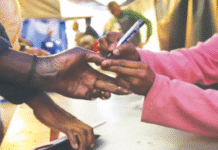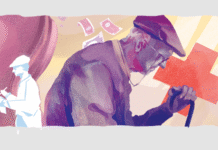by David Lewis
Following a recent visit to Dhaka, David Lewis reflects on the narrowing civil society space in Bangladesh under the increasingly defensive Awami League government.
Bangladesh has long been known as a country with a vibrant civil society. It has some of the best-known non-governmental development organisations (NGOs) in the world (see for example BRAC), as well as longstanding traditions of citizen protest and advocacy, rooted in the longer history of Bengal and East Pakistan. But as we move further into the second term of Bangladesh’s Awami League government, there are signs that civil society space is narrowing. The government of Sheikh Hasina Wazed was re-elected unopposed for an unprecedented second term of office in January 2014 after the main opposition BNP refused to take part in elections following a row over the election arrangements. The political turmoil has continued through the recent mayoral elections.
Spending a few days in Dhaka last week after being away for over a year, I was struck by growing concerns among civil society activists and professionals that I spoke to that the government is increasingly adopting a more authoritarian style, becoming less willing to tolerate dissent, and putting constraints on activists in the non-governmental sector. The trend has been building for some time.
Bangladesh’s development NGO sector has become less diverse than it once was. Its radical ‘social mobilisation’ wing has long faded away, with only a few organisations such as Nijera Kori keeping the rights-based, empowerment approach that forms an alternative to the provision of micro-credit that today represents the main – and in some quarters increasingly discredited – business of most development NGOs. The sector is now made up of relatively few key players such as BRAC (which these days is closer to a social enterprise than an NGO), large numbers of small contracting organisations that mainly serve government service delivery, and a shrinking space for critical civil society groups and voices. The government has long wanted to introduce new regulatory NGO law that would increase its power to control non-state organisations. Although this has stalled for the time being, it remains a contentious issue.
The fall-out from the International Crimes Tribunal (ICT), the country’s war crimes tribunal, which has been ongoing since 2009 is another driver of this new climate. Most civil society organisations and activists share the government’s objective of seeking justice in relation to the war crimes committed by Pakistan’s army and its local collaborators in 1971. But when civil society activists have raised concerns about due legal process the courts, the government have hit back with harsh penalties. When activists recently signed a letter in support of human rights lawyer David Bergman, placed in contempt of court after setting up a blog that asked legal questions about the process, they too were held in contempt and some were made to pay a fine.
The implementation of the Chittagong Hill Tracts Peace Accord has stalled, and as a result the underlying land issues remain largely unresolved. The peace accords were agreed in 1997 and aimed to end the longstanding conflict between indigenous jumma peoples and Bengali settlers. Following a ban on organisations meeting with indigenous communities the CHT issue is increasingly closed to civil society voices, which means there is unlikely to be movement on it in the near future.
Faced with a government that has begun to talk about the significance of China’s development model, the tradition of a sub-sector of civil society groups working to promote democratic governance through democracy training, parliamentary training and election monitoring seems ever more out of step with reality.
Furthermore, while the NGO community has usually steered a careful course of avoidance of becoming too close to politicians and has mostly preserved a non-party political line, civil society is now becoming more politically polarised. It is becoming less unusual for some NGO leaders, for example, to allow themselves to be identified with political groups than perhaps was the case previously. The divisions were particularly noticeable earlier this year in the run up to the Dhaka mayoral election in April.
Many Bangladeshis recall the Bangladesh Krishak Sramik Awami League (BAKSAL) era was when PM Sheikh Mujibur Rahman – the father of the current PM Sheikh Hasina – briefly established one party rule in January 1975, not long before he was assassinated in a military coup. Comparing the current climate to the BAKSAL era has long been a favourite theme of the opposition following the 2014 election. But today there are some civil society leaders who are also beginning to feel that such comparisons may not be so far off the mark.
Indeed, there is also a growing visibility of the army, as the government seeks to keep the military onside during a period of continuing political uncertainty and potential instability. Careful to maintain good relations, the PM has highlighted the role of the military as helping to facilitate elections and as guardians of democracy.
The government is insecure and fears – with good reason – the influence of Islamist groups on the one hand and the military on the other. The hope is that this new defensiveness does not do damage to the country’s hard-won civil society space, which has long been an important contributor to the country’s continuing political development and its development success story.
Source: LSE










I fully agree with the analysis of Prof David Lewis that at the present time Bangladesh’s genuine non-partisan civil society is increasingly losing its space and presence and that its eventual outcome can only be rise of extremism, Islamism. Indeed, given this government’s record of corruption, authoritarianism etc.and given Prime Minister Hasina’s increasing dependence on repressive measures against all forms of criticisms, opposition etc. and its concession-giving relationship with India for its survival, most Bangladeshis see her government as much abusive as slavish (in relation to to India, that is). The latter perception is particularly disturbing because as Prof.Lewis eludes to in his article, this would certainly promote a coalition of Islamists and the Army but instead of looking fundamentalist such a coalituon, if it eventuates, would start to look more like a nationalist force fighting to restore country’s soverignty – political, economic and also spiritual (there is also this perception that under Hasina’s ‘secular’ regime, the country is losing its ‘muslimness’). This was also more or less the backdrop of 1975 coup – Mujib became unpopular for his authoritarianism and his government lost credibility because of corruption and poor administration and also if not mainly because of the perception that his government “sold the country to India”. The only anti-dotes to coups and extremisms are democracy, freedom and fainess – sooner we realize this better it is for all of us including those that suppress freedom and democracy for narrow selfish reasons!
Can’t agree more with David Lewis’ article and ADK’s comment.